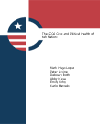Special Report: The 2006 Civic and Political Health of the Nation
by CIRCLE Staff
The 2006 National Civic and Political Health Survey (CPHS) is the most up-to-date and detailed look at how young Americans are participating in politics and communities and their attitudes towards government and current issues. In this report we examine the civic engagement of young Americans and adults across 19 core measures of engagement. We also examine attitudes towards government, levels of political knowledge, partisanship, and views of elections and politics.
- Download The 2006 Civic and Political Health Survey (CPHS) Report
- Download the Toplines of The 2006 CPHS
- Read the The 2006 CPHS Press Release
- Download a Powerpoint presentation of The 2006 CPHS
- Measure your civic engagment with our pen and paper survey
- Read more about The 2002 Civic and Political Health Survey
Conventional wisdom is challenged by the new report on the political and civic involvement of young Americans. Young people are working in many ways to improve their communities and the nation by volunteering, voting, protesting, and raising money for charity and political candidates. In addition, African-American and Asian-American youth are the most engaged, according to the study conducted by the Center for Information & Research on Civic Learning & Engagement (CIRCLE). But, the findings also show that a large group of young people are completely disconnected from civic life. In the last year, more than 36 percent of young people aged 15-25 volunteered, nearly 20 percent have been involved with solving community problems, and almost a quarter had raised money for charity.
Selected Major Findings:
- Young Americans are involved in many forms of political and civic activity. For example, 26% say they vote regularly (age 20-25 only); 36% have volunteered within the last year; and 30% have boycotted a product because of the conditions under which it was made or the values of the company that made it.
- Nevertheless, a considerable proportion of young Americans are not very engaged, including 17% who have not done any of 19 possible forms of participation within the last 12 months.
Political knowledge is generally poor, and it matters
- Most young Americans are misinformed about important aspects of politics and current events. For example, 53% are unaware that only citizens can vote in federal elections; only 30% can correctly name at least one member of the President’s Cabinet (and of those, 82% name Secretary of State Condoleeza Rice); and only 34% know that the United States has a permanent seat on the United Nations Security Council (compared to 27% who know that France holds a seat).
Young people are tolerant, but somewhat less so than in 2002
- Although young people remain more favorable toward immigrants and gays than their elders, there has been a decline in youth tolerance for those two groups since 2002.
- Sixty-seven percent say they have confronted someone who said something that they considered offensive, such as a racist or other prejudiced comment.
Young people have lost confidence in government
- Two thirds of young people believe that government should do more to solve problems, but a plurality says that the government is “almost always wasteful and inefficient.” This represents a big drop in confidence since 2002.
- Young people, no matter which political party they identify with, are more likely to say that government is almost always wasteful and inefficient today than in 2002. Changes in this view have been greatest among Democrats and Independents, and smallest among Republicans.
- Young people who are more engaged in their communities have more positive views of government than those who are less involved. However, substantial numbers of young people, no matter their level of engagement, say “government is almost always wasteful and inefficient.”
African-Americans and Asian-Americans are engaged; many Latinos have protested
- Young African-Americans are the most politically engaged racial/ethnic group.
- Young Asian-Americans—surveyed for the first time across a wide range of civic indicators—are highly engaged in volunteering and in several other ways.
- Although young Latinos are generally not as engaged as other racial/ethnic groups, 25% said that they had participated in a protest—more than twice the proportion of any other racial/ethnic group. It appears that the marches concerned with federal immigration policy last spring drew a substantial proportion of the national Latino youth population.
The survey was conducted from April 27 to June 11, 2006 by telephone and online survey and released on October 3. The survey provides nationally representative samples of young people and adults. Overall, 1,700 young people ages 15 to 25 were surveyed along with 550 adults ages 26 and older. The survey includes over-samples of young Latinos, African-Americans, and Asian-Americans. The questionnaire for this survey largely replicates one designed by Scott Keeter, Cliff Zukin, Molly Andolina, and Krista Jenkins fielded in 2002.






